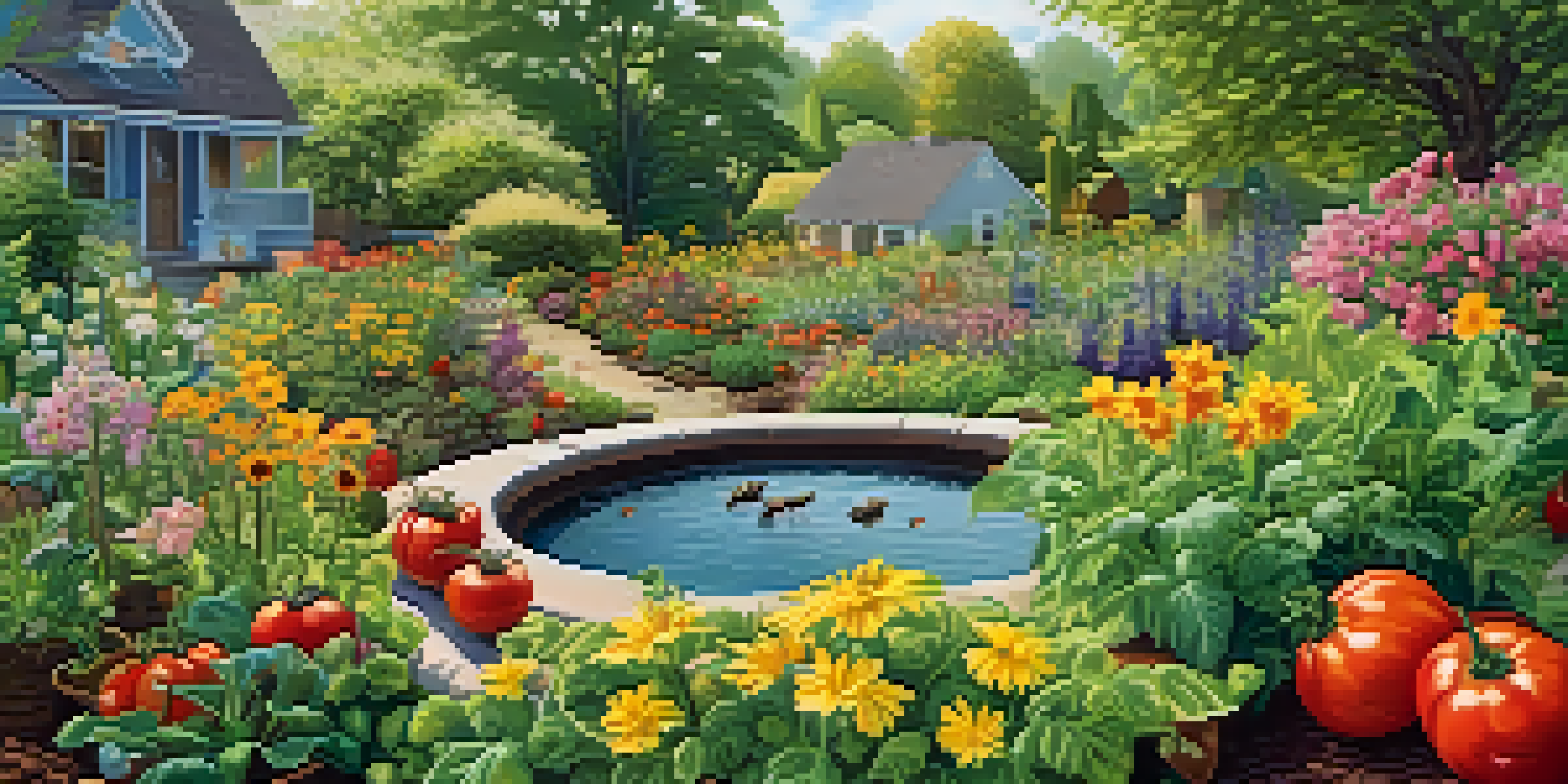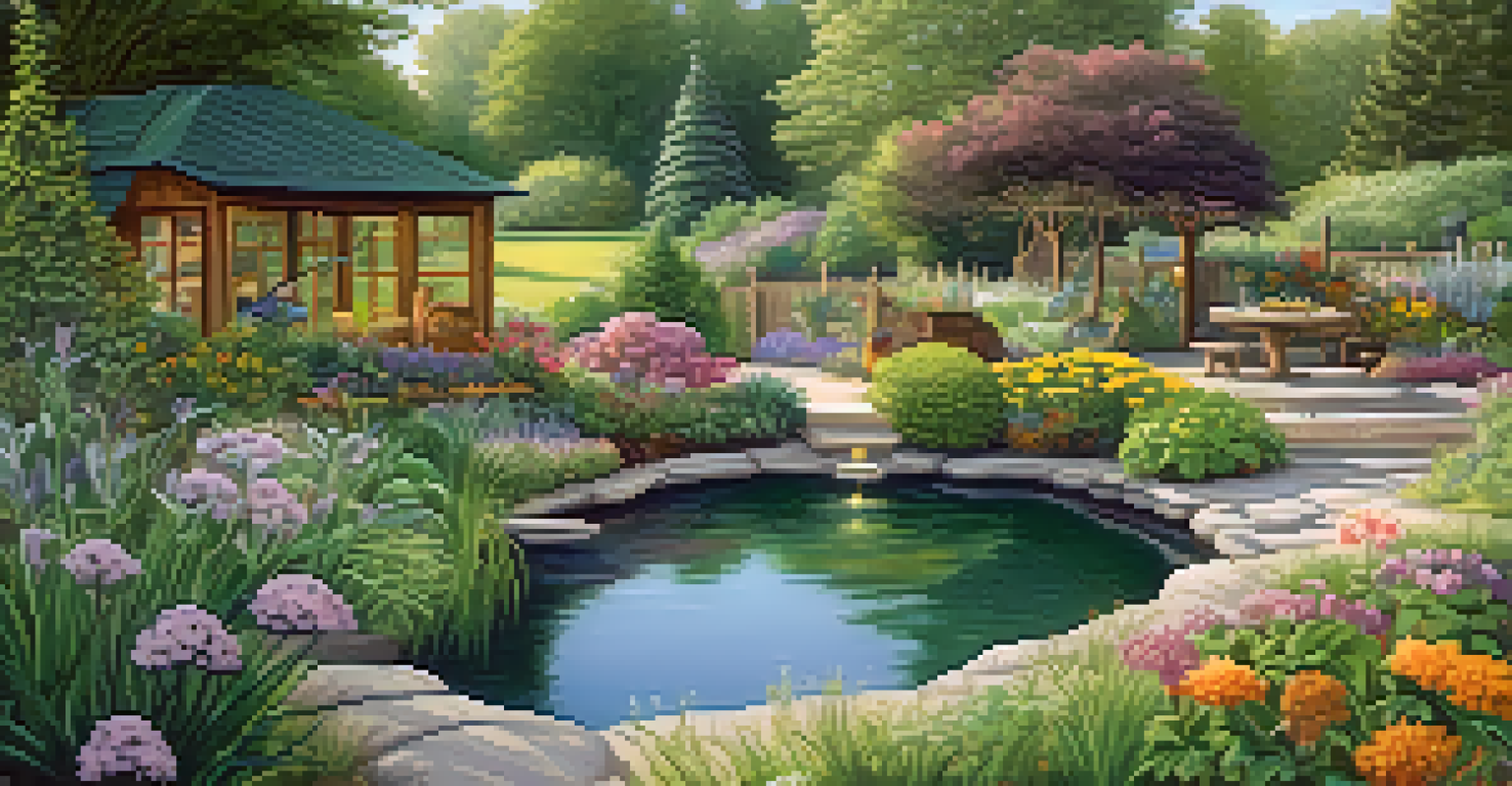The Benefits of Organic Gardening for Local Wildlife Health

Understanding Organic Gardening and Its Principles
Organic gardening is a method that focuses on growing plants without synthetic fertilizers or pesticides. Instead, it relies on natural processes and organic materials to enhance soil health and promote biodiversity. This approach not only produces nutritious fruits and vegetables but also creates a thriving habitat for local wildlife.
The greatest threat to our planet is the belief that someone else will save it.
By avoiding harmful chemicals, organic gardening fosters a healthier environment for various species, including beneficial insects, birds, and small mammals. It emphasizes the importance of soil health, which is vital for sustaining plant life that wildlife depend on. Ultimately, this gardening technique supports a balanced ecosystem.
The principles of organic gardening encourage practices like crop rotation, composting, and using native plants. These methods help maintain soil fertility, reduce pests naturally, and provide food and shelter for local wildlife. When we choose organic gardening, we are making a commitment to the health of our environment and its inhabitants.
Enhancing Biodiversity Through Organic Practices
One of the key benefits of organic gardening is its ability to enhance biodiversity. By planting a variety of species, gardeners create a rich tapestry of life that attracts numerous animals, insects, and pollinators. This diversity is essential for a healthy ecosystem, as it ensures resilience against pests and diseases.

For instance, planting flowers alongside vegetables can attract pollinators like bees and butterflies, which are crucial for crop production. These beneficial species not only help with pollination but also provide food sources for birds and other wildlife. By promoting a diverse range of plants, gardeners can help sustain local ecosystems.
Organic Gardening Enhances Biodiversity
By utilizing diverse plant species, organic gardening attracts beneficial wildlife and strengthens ecosystem resilience.
Moreover, organic gardening practices such as interplanting and companion planting can create microhabitats that support various wildlife. These techniques encourage natural pest control by attracting predatory insects, thereby reducing the need for chemical interventions. In turn, this creates a harmonious environment where all species can thrive.
Creating Natural Habitats for Wildlife
Organic gardens can serve as sanctuaries for local wildlife by providing essential habitats. By incorporating native plants, gardeners can create environments that mimic natural ecosystems, offering food, shelter, and breeding grounds for various species. This is especially important as urbanization continues to encroach on natural habitats.
Nature does not hurry, yet everything is accomplished.
For example, planting shrubs and trees can provide nesting sites for birds, while flowering plants can attract pollinators and other beneficial insects. Gardeners can also create water features like ponds or birdbaths, which attract wildlife and support their hydration needs. These small changes can make a significant impact on local wildlife health.
Additionally, organic gardening encourages the use of natural materials for landscaping, such as logs and stones, which can create hiding spots for small mammals and insects. By fostering these natural habitats, gardeners play a crucial role in preserving local biodiversity and ensuring the survival of various species.
Reducing Chemical Runoff and Pollution
One of the major environmental benefits of organic gardening is the reduction of chemical runoff and pollution. Traditional gardening often involves synthetic fertilizers and pesticides, which can leach into waterways and harm aquatic life. Organic gardening minimizes this risk by using natural alternatives that are less harmful to the environment.
For instance, compost and organic fertilizers improve soil health without introducing toxic substances. This not only benefits the plants but also helps prevent harmful runoff that could contaminate local streams and rivers. Healthy soil retains nutrients and water better, further reducing the need for chemical inputs.
Creating Habitats for Local Wildlife
Incorporating native plants and natural features in gardens provides essential food and shelter for various species.
By adopting organic practices, gardeners contribute to cleaner water systems and healthier ecosystems. This shift away from chemicals helps protect the delicate balance of local wildlife populations and their habitats. Ultimately, organic gardening promotes a sustainable approach to land use, benefiting both the environment and community.
Supporting Pollinator Populations Through Organic Gardening
Pollinators, including bees, butterflies, and hummingbirds, play a vital role in our ecosystems, and organic gardening is a powerful way to support their populations. By planting a variety of flowering plants that bloom at different times, gardeners can provide a continuous source of nectar and pollen throughout the growing season. This is essential for the survival of many pollinator species.
Moreover, organic gardens often avoid the use of pesticides that can harm these crucial insects. By creating a welcoming environment for pollinators, gardeners can help combat the decline in their populations, which has significant implications for food production and ecological health. Pollinators are not only essential for crops but also for the overall health of various plant communities.
In addition to flowers, providing nesting sites such as bare soil patches or bee hotels can further support pollinator habitats. These simple additions can make a big difference in encouraging pollinator abundance and diversity. By prioritizing pollinator-friendly practices, organic gardeners contribute to a sustainable and thriving ecosystem.
Promoting Soil Health for Wildlife and Plants
Healthy soil is the foundation of any thriving garden, and organic gardening places a strong emphasis on nurturing it. By using natural amendments like compost, gardeners can enhance soil structure, fertility, and microbial activity. This not only benefits plants but also creates a healthier environment for the wildlife that relies on them.
For instance, a rich and diverse soil ecosystem supports the growth of strong plants, which in turn provide food and shelter for various animals. Healthy soil also retains moisture better, reducing the need for irrigation and helping to conserve water. This is particularly important in areas facing drought or water scarcity.
Reducing Environmental Pollution
Organic gardening minimizes chemical runoff, promoting cleaner water systems and healthier ecosystems.
Additionally, organic practices such as crop rotation and cover cropping can prevent soil erosion and nutrient depletion. By maintaining soil health, gardeners create a sustainable environment that supports both plant life and local wildlife. In this way, organic gardening fosters a symbiotic relationship between the soil, plants, and the creatures that depend on them.
Encouraging Community Involvement in Wildlife Health
Organic gardening can serve as a catalyst for community involvement in wildlife health. By engaging in local gardening initiatives, community members can come together to create green spaces that benefit both people and wildlife. These collaborative efforts can raise awareness about the importance of biodiversity and inspire others to adopt sustainable practices.
Community gardens often attract a variety of species, creating habitats that support local wildlife populations. They provide educational opportunities for residents to learn about organic gardening and its benefits, fostering a sense of stewardship for the environment. This collective action can have a lasting positive impact on local ecosystems.

Moreover, community-driven efforts can lead to the implementation of policies that support organic practices in urban planning. When neighborhoods prioritize green spaces and wildlife habitats, they create healthier environments for everyone. Through organic gardening, communities can work together to protect local wildlife and promote a sustainable future.